The next big event in God’s program for all believers is the coming of Christ to take them to be with Himself. Most theologians call this event the Rapture of the Church. But does the Bible give us any details on what will happen at the second coming of Christ? Yes, it does.
The apostle Paul describes this event in two passages: 1 Thessalonians 4:13-18 and 1 Corinthians 15:50-52 while John refers to it in John 14:1-3 and 1 John 3:2-3.
Who are the Believers?
Before getting into what God has in store in the future for the believers in Jesus Christ, we need to set things straight right from the get-go and define our terms properly. So as mentioned earlier, the return of Christ is something that believers are looking forward to. But who are the believers or Christians?
Admittedly, the term “Christian” is often used in the broadest sense. Most, if not all people automatically assume that if you’re not a Muslim, a Buddhist, a Jew, etc. then you are a Christian. But is this assumption correct? Not really!
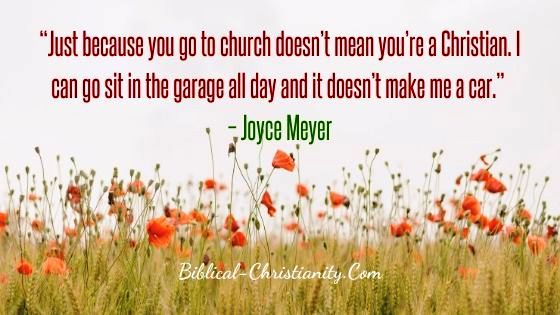
The believers are those who acknowledged that they are lost and in need of a Savior from sin and as a result have made the decision to repent and completely trust in the Lord Jesus to be Lord of their lives (John 1:12; John 3:16). In other words, they are those who have been redeemed from the power of sin and death through the suffering, death, and resurrection of the Lord Jesus Christ.
If you are a believer in Jesus and a redeemed Christian, there is a glorious future waiting for you.
What Will Happen When Christ Comes?
There are 3 major events that will take place at the second coming of Christ: 1) concerning the Lord Jesus, 2) concerning the believers who had died and, 3) concerning the believers who are alive at the time of the return of Christ.
The Lord Jesus
The first event to transpire when Christ comes to take believers will be that Jesus Himself will descend from heaven (1 Thessalonians 4:16a).
“For the Lord, Himself will descend from heaven with a shout, with the voice of an archangel, and with the trumpet of God.”
Looking at this verse more closely, three truths become apparent:
A. It will be Jesus and no one else who will come.
Jesus will come personally for the believers as He promised in John 14:1-3. After Jesus announced His soon-to-be departure and Peter’s upcoming betrayal, the apostles were troubled. But Jesus promised to them that this won’t be their last time together because as soon as everything is ready He will return for His people so that they will always be with Him wherever He is.
B. Another truth that is expressed in the above-mentioned verse is that Jesus will be coming from heaven into which He was seen last going.
In Acts 1:9-11, we read how Jesus was taken up into a cloud in full view of the people watching. And while they looked steadfastly toward heaven, two men in white apparel said, “Men of Galilee, why do you stand gazing up into heaven? This same Jesus, who was taken up from you into heaven, will so come in like manner as you saw Him go into heaven.”
C. Jesus’ coming will be accompanied by an appropriate signal.
Paul describes the signal that will accompany Christ’s return as being “with a shout, with the voice of the archangel, and with the trumpet of God.”
Wait a minute; will there be three different signals? No! Understand that Paul is referencing the signal as a triad in which the last two things describe the first. Paul is saying that Christ’s return will be accompanied by a shout and that shout will be like the voice of an archangel and like the trumpet of God.
So the only sound that will be heard will be the shout and when it is heard some will think that an archangel has spoken or sounded God’s trumpet.
This “shout” is a military term that is used for the signal that was sounded to gather troops together. If we look at other translations such as the New International Version, the verse says, “For the Lord himself will come down from heaven, with a loud command, with the voice of the archangel and with the trumpet call of God.”
The “shout” that will be heard will be like a loud command by the captain of a troop to gather them. That’s exactly what Jesus will do when He comes – He will gather all believers of this age whether living or dead together to take them to heaven.
The Dead Believers
The second event to transpire at the second coming of Christ will be the resurrection of the bodies of the believing dead to be reunited with their spirits.
Paul says that “the dead in Christ shall rise first” (1 Thessalonians 4:16b). Take note of the word “first” which is the most important word in the statement. With this, we know that living believers will not meet the Lord ahead of the believers who have died.
In fact, if we go back to verse 15, Paul points out that believers who have died will not miss out on Christ’s coming. What is the authority of Paul’s instruction? It’s “the word of the Lord,” which lets us know that what he is saying is important and not to be treated lightly because this revelation was one that has been given directly to Paul by God.
We find no explicit statement in the Gospels that spells out in detail the return of Christ for the church. That’s why in 1 Corinthians 15:51, Paul says, “Behold, I tell you a mystery.” Now let us avoid making the assumption that a mystery is something mysterious.
In the New Testament, a mystery is the revelation of some truth that had been previously given. It is something that has been there from the beginning. But prior to the revelation of a mystery, no one could have had any knowledge or understanding concerning it.
Note: Some theologians believe that the apostle Paul received this revelation at Sinai in Arabia, the same exact place where Moses received “The Law” (The Ten Commandments). After his encounter with the risen Jesus on the road to Damascus, Paul did not go immediately to Jerusalem to meet with the apostles. Instead, he went to Arabia and afterward returned to Damascus (Galatians 1:10-18).
So again, as Paul said when Christ returns the dead in Christ shall rise first according to the revelation that he received from God.
Paul Educates the Believers in Thessalonica
In order for us to better understand and properly interpret the letter of Paul to the Thessalonians, we need to know his intent.
It is generally believed that Paul stayed in Thessalonica for about three to four weeks. After pioneering a church there, he had to leave the city along with Silas and Timothy into Athens. Although they intended to return, they were hindered (1 Thessalonians 2:17-18).
Paul then sent Timothy from Athens to Thessalonica to see how the church was doing. Upon his return, Timothy reported to Paul that the believers were doing well; except for one problem that concerned some questions and a certain amount of anxiety that some of them were having regarding their loved ones who had died.
The believers in Thessalonica rightly understood that Christ was going to return, as Paul taught them. However, it never crossed their minds that some of their loved ones would die before the event took place. And so all sorts of questions were going through their minds: “Will their dead loved one miss out on Christ’s coming? What will happen to them when Christ returns for the church? Will they have an advantage over the living believers?”
So Paul educates them and assures them that all those who died in Christ prior to the second coming will not miss out on anything; in fact, they will already have entered the presence of Christ. He goes on to tell them not to grieve like those who have no hope because when Christ returns God will bring with Him the spirits of the dead believers to be reunited with their glorified bodies (1 Thessalonians 4:13-14).
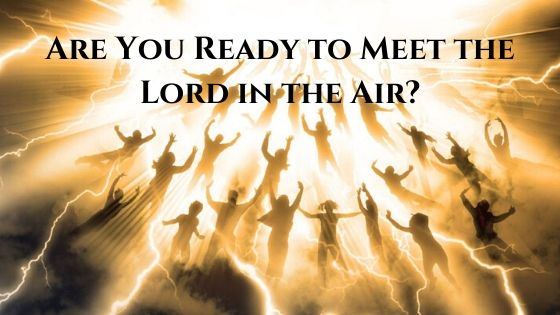
The Living Believers
The third event deals with the living believers. Clearly, believers will be living when Christ comes to take them to be with Himself. But what will happen to living believers at the second coming of Christ?
Paul does not answer this question in 1 Thessalonians 4 because his emphasis there is to point out what will happen to those “in Christ” who died physically prior to Christ’s return since that was the specific concern of the Thessalonians believers.
So we go to 1 Corinthians 15:50-52 where Paul tells us the details of what awaits the living believers at the second coming of Christ.
“Now this I say, brethren, that flesh and blood cannot inherit the kingdom of God; nor does corruption inherit incorruption. Behold, I tell you a mystery: We shall not all sleep, but we shall all be changed – in a moment, in the twinkling of an eye, at the last trumpet. For the trumpet will sound, and the dead will be raised incorruptible, and we shall be changed.”
From this passage, we see four things that will happen to the raptured believers:
1. First, they will be immediately glorified.
Believers need to be glorified because unglorified humanity cannot go into God’s presence. A change must take place before mortal physical beings can be equipped for the eternal state. That change is “glorification” which is the final phase of salvation.
All believers will be transformed; everything that makes them mortal is removed and replaced with immortality. This fact is proclaimed in the words, “but we shall all be changed.” This verse summarizes the process that will equip the living saints for an eternal existence. Their bodies will be changed so that they will not wear out or decay. They will truly “inherit the kingdom of God.”
This process of glorification is described in three dimensions:
(1) As it relates to time, it will be “in a moment.” It describes the smallest indivisible unit of time. That is how long it will take for God to effect the change in the body of every living believer when Christ returns.
(2) As it relates to sight, it will be “in the twinkling of an eye.” Paul’s expression is used to describe any rapid movement such as the flapping of wings or the twinkling of lights. The emphasis here is upon speed. The bodies of living believers will be glorified in the same amount of time it takes the eye to twinkle when it is struck by light.
(3) As it relates to sound, “at the last trumpet.” This “last trumpet” is the same trumpet mentioned in 1 Thessalonians 4:16. It is the same time at which God will raise the bodies of all the believing dead.
With these three figures, Paul is showing that a lot will happen in a very short period of time. At the same time that the bodies of the believing dead are raised, the bodies of living believers will be changed.
These two separate programs that God will run when Christ returns will take place successively, but together they will be accomplished so quickly that it will appear as if they happened simultaneously. In the smallest possible moment of time, everybody of every believer who has believed in Christ from the day of Pentecost until the day that Christ returns will be raised from the graves in which they have been resting.
Both of these programs of God will be completed in less time than it takes for an eye to twinkle when struck by light. What a glorious future that lies ahead for those who have believed in Jesus!
Note: What is the “mystery” that has been revealed by God directly to Paul? That some believers will not die physically.
Even if Hebrews 9:27 says, “It is appointed for man to die once and after that faces judgment,” there are believers who will not experience death in their lifetime as Paul tells us in 1 Corinthians 15:51.
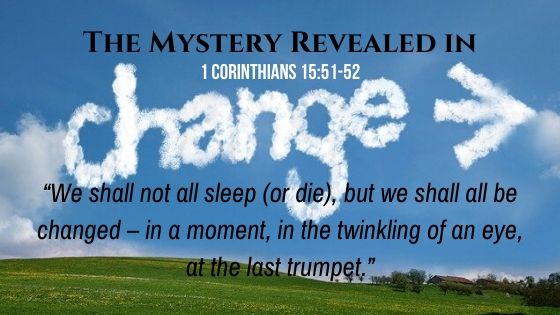
Paul used the word “sleep” to describe the physical death of believers both in 1 Corinthians 15 and 1 Thessalonians 4. The figure is a beautiful one because when one sleeps he does so to take a rest in the full expectancy of being awakened to continue meaningful activity.
It is important to note that it is not the soul that sleeps but the body. When a believer dies, his body is asleep. That’s why it has to be buried in a cemetery. The English word cemetery comes from two Greek words, koime (sleep) and tere (a keeping place).
Thus, a cemetery is a place where the sleeping bodies of believers are kept until the time that Christ returns to awaken those sleeping bodies, glorify them, and reunite them with their souls that upon death went immediately into God’s presence.
The important thing that Paul is revealing to the Corinthians is that at the time of Christ’s return there will be some believers living but who will undergo a change in order to be able to enter God’s presence.
Clearly, Paul believed that he and his Thessalonian readers might well be alive when the Lord returned. He believed that Christ’s coming was imminent, that it could take place at any moment. Many times he used statements such as “the time is short” (1 Corinthians 7:29) and “the Lord is near” (Philippians 4:5).
2. They will be reunited with the resurrected believers.
After living believers receive their glorified bodies, they will be reunited with the resurrected believers who have preceded them in being glorified. They will be “caught up” together with the resurrected believers (1 Thessalonians 4:17a).
The word “caught up” is harpazo in Greek, which means to seize or snatch away suddenly. In Latin, the word is rapio which is where we get the word “rapture.” In this event, believers will be removed from this earth and reunited with the resurrected believers.
This will be the second meeting of the universal body of believers known as the church, the body of Christ. The first meeting took place on the Day of Pentecost when the church was born. Since that time, the universal church has not met.
3. They will meet Jesus personally in the air.
The third experience that living believers will undergo when Christ returns for them is that they will meet Jesus personally in the air. Paul tells us that this meeting will take place “in the clouds,” which is his way of describing our atmospheric heavens (the second heaven).
Paul uses a picturesque to describe this meeting. It is a word used of greeting a newly arrived magistrate. Such meetings usually took place outside of the city walls and then they all returned to the regular abode to continue the formalities. This, then, is a picture of how we will meet the Lord and then later will return to reign with Him when He comes to set up His Kingdom.
4. They will be with Jesus forever.
After meeting with the Lord in the air, all believers will be with the Lord forever (1 Thessalonians 4:17c).
With this statement Paul lets us know that this meeting with the Lord will never end. It will be a personal association with resurrected believers and with Christ. This will be the final fulfillment of our Lord’s promise in John 14:3, “I will come again and receive you to Myself; that where I am, there you may be also.”
Comfort for the Believers Today
Knowing that Christ would one day return to take us to be with Him for all eternity should comfort our hearts (1 Thessalonians 4:18).
“Therefore comfort one another with these words.”
Whenever there is a loss of a loved one, we are to comfort one another. It is true that the death of a loved one brings sadness to us, but we should “not grieve as do the others who have no hope,” for we have comfort. We find comfort in knowing that our loved ones who died will not miss out on Christ’s coming.
In fact, they will have precedence and prominence in it. That is if they have repented of their sins and accepted God’s gift of salvation prior to their passing.
We also find comfort in knowing that if we would be alive when Christ returns, we will not experience death. But we will be immediately glorified, caught up into the atmospheric heavens to be reunited with our loved ones who died to meet the Lord in the air and be forever with Him.
Believers Must Purify Themselves
Knowing that Christ could return at any moment also causes us to purify our lives (1 John 3:2-3).
“Beloved, now we are children of God; and it has not yet been revealed what we shall be, but we know that when He is revealed, we shall be like Him, for we shall see Him as He is. And everyone who has this hope in Him purifies himself, just as He is pure.”
We should purify our lives because of our present position. We are “children of God,” and we should bear the image of our heavenly Father, which is absolute holiness and purity.
Conclusion
From these passages, we had a glimpse of what the future holds for us as believers in the Lord Jesus. We know that God is faithful and will fulfill His promise to take us from this chaotic world to be forever with Him. This should give us hope, despite the trials and suffering that we might be facing.
Whatever situation we are in right now, no matter how difficult the circumstances we are facing, they are nothing compared to the wonderful and glorious future that awaits us.
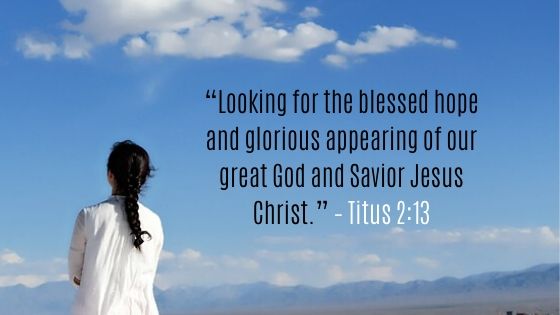
The Second Coming Christ for the Church or the Rapture is the “blessed hope” of the believers; it is our blessed hope. But while we wait, let us reject ungodliness and worldly passions, and let us live self-controlled, upright and godly lives in this present age Titus 2:11-14).
Recommended Resource: Preparing for Jesus’ Return: Daily Live the Blessed Hope
By A.W. Tozer
This never-before-published book is Tozer’s incomparable teaching on the book of Revelation. Discover his fresh and timely perspective on the purpose of prophecy, which he believed is to lift our gaze from the immediate to the eternal.
Preparing for Jesus’s Return offers a panoramic view of what is to come and examines what it means for you, your church, and the world. No one knows when the Lord will return, but the assurance of His coming is our Blessed Hope!

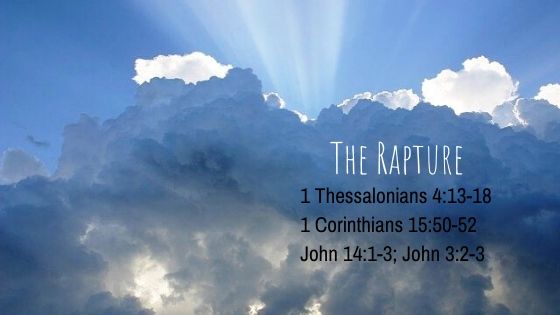
I recently heard someone speak in the Book of Revelation saying the rapture and second coming of Jesus will take place simultaneously? Is this true?
Hi Harold,
Thank you for your thoughtful question!
The timing of the Rapture in relation to the Second Coming of Christ is a topic with varying interpretations among Christians. Some believe the two events will occur simultaneously, while others suggest there will be a time gap between them.
Since Scripture does not provide a definitive timeline, it’s an area where we can only seek to understand as best we can.
What we do know from the Word of God is that the Rapture precedes the Second Coming (or Second Advent). This is a clear sequence revealed in Scripture.
Ultimately, the most important takeaway is to live prepared and watchful, as the Rapture could happen at any moment.
Let’s keep our focus on our walk with Christ and encourage others to do the same.
Have a blessed day!
Thank you for the clarity.
You are welcome and God bless!
Was quite inspiring and educative.
Hello Joseph,
Appreciate you stopping by and thank you for reading the article.
The the return of Christ to take His saints with Him to heaven as mentioned by Paul in 1 Thessalonians 4:13-18 and in 1 Corinthians 15:51-54 is our blessed hope. It should inspire and encourage us to live a holy life because no matter what difficulties we maybe experiencing today, nothing will compare to the joy and bliss that is awaiting us.
Heaven is our final destination and eternal home and so it is but proper that we spend our days or years (the Lord-willing) looking forward to that wonderful and glorious day when we will finally meet our Lord face to face.
Shalom, God bless you more!